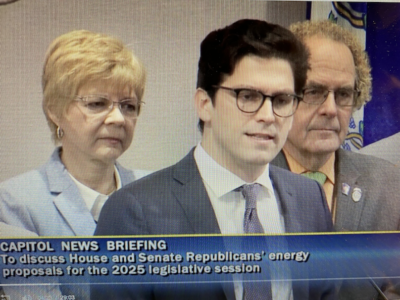
HARTFORD – Calling Democrats’ plan to reduce energy rates a bill about “nothing,” state Republicans have proposed their own six-point plan – something they have put forth before.
“We hear from our constituents again, again, and again that we have unaffordable electric rates in our state,” said Republican Senate Minority Leader Stephen Harding of Brookfield during a press conference Wednesday, Jan. 22. “Some reports have us at the most unaffordable state in the United States of America when it comes to energy rates. It’s unacceptable at every level.”
At that press conference Republican state Sen. Ryan Fazio of Greenwich unveiled what he and his colleagues call the Consumers First Act, a six-point plan to bring about relief and sustainability for consumers.
“Electricity costs are still too damn high,” said Fazio, ranking member on the Energy and Technology Committee. “Anyone who has seen their January electric bill can tell you that. Connecticut residents are hurting from these high costs, and they are begging their elected officials to do something about it. We have been offering specific plans for the last two years to do just that, including removing public benefits charges that are inflating electric bills.”
The Republicans’ plan to reduce energy costs calls for the following actions:
- Eliminate the “Public benefits Charge” (a hidden tax) on your electric bill
- Cap the price of all future long-term energy purchases
- Redefine the definition of Class I renewable energy sources to include nuclear and hydropower
- Separate the Public Utilities Regulatory Authority from Department of Energy and Environmental Protection
- Eliminate incentive programs that increase electric demand, including the electric vehicle rebate program
- Increase the supply of natural gas
Democrats’ plan
On Jan. 16, Senate Democrats unveiled the “Ratepayers First Act,” which seeks to address costs, enhance the reliability of Connecticut’s power grid, increase energy production, and ensure utilities prioritize ratepayers ahead of shareholders.
Legislators have heard constituents’ frequent and warranted complaints about the cost of energy in Connecticut and are seeking substantial changes to state energy practices that relieve those costs while still working within the state’s long-term energy goals.
“The future is complicated, to say the least, when it comes to Connecticut’s energy grid,” said Senate President Martin M. Looney. “Future demand on the power grid, fluctuations in energy markets, new growth and investments in our communities all represent increased consumption, and as a result, we’re pursuing more options in generation to make sure our state can meet future challenges.
Senate Majority Leader Bob Duff of Norwalk calls for a full review of the state’s energy policies.
“High costs remain a major source of frustration for Connecticut ratepayers, and rightfully so,” Duff said. “To address this, we are planning to review all of our state energy policies to find areas of improvement. I’m grateful for Senator (Norm) Needleman’s constant and meaningful focus on how our power grid impacts Connecticut residents and his approach toward beneficial improvements.”
The bill seeks to address the high cost of energy in Connecticut, ensure and retain reliability of services, enhance and support energy production in-state and ensure that utilities consider ratepayer needs as much as quarterly dividends for their shareholders.
The legislation also seeks to evaluate any and all mechanisms to reduce costs for ratepayers. One potential example of this includes involves the potential shift of electric vehicle charging programs into transportation bonding, reducing future costs and ending ratepayer subsidization of EV infrastructure and installation.
Improving power grid reliability
Under this bill, lawmakers will seek to build upon accountability measures achieved in past legislative efforts, including those earned in 2020’s Take Back Our Grid Act and 2023’s Senate Bill 7, that emphasize the performance of utilities in order to ensure preventable power outages become less frequent while supporting the tireless efforts of line workers across the state.
Democratic lawmakers aim to increase the power supply available to Connecticut in order to meet demand that is ever-growing across the state. Strategies to achieve this may include increased focus on the adoption of a variety of generation options, including but not limited to solar and nuclear power.
The Democrats also seek to ensure ratepayers and customers remain utilities’ primary interest over quarterly profits and shareholder payouts. In doing so, they will continue to pursue pro-ratepayer measures achieved in the Take Back Our Grid Act and SB7, while pursuing new options that can better ensure accountability for utilities; one such measure could involve requiring state utilities to comply with state Freedom of Information Act laws.
Republican leader Harding called the Democrats’ plan a bill about nothing, akin to the 1990s sitcom “Seinfeld.”
“The Senate Democrats came up with a plan that is literally about nothing,” Harding said. “As Republicans, when we see a bill about nothing, we say, ‘hey, we have a bill about something.’ And we have been talking about it for two years now.”





















